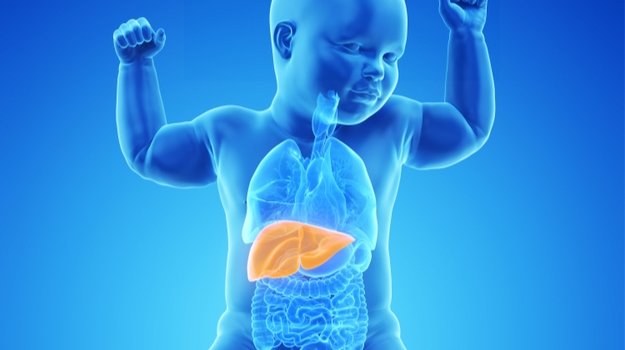
Liver Diseases in Children: Causes, Symptoms & Treatments
he liver is one of the body’s most vital organs, processing nutrients, filtering toxins, storing energy, and aiding digestion. When a child has liver disease, it can disrupt these essential functions, leading to a wide range of health complications.
Unlike adults, liver diseases in children may present differently and require specialised care. However, early diagnosis and treatment by an experienced Pediatric Gastroenterologist can significantly affect outcomes, empowering parents and caregivers to take proactive steps in their child’s health.
Understanding Liver Disease in Children
Liver disease in children refers to any condition that affects the structure or function of the liver. It can be present at birth (congenital), develop due to an infection, be caused by autoimmune disorders, or arise from genetic and metabolic conditions. Some liver diseases in children are acute, meaning they develop quickly and resolve with treatment, while others are chronic and may require long-term care.
Common Causes of Liver Disease in Children
Several factors can contribute to liver problems in children. These include:
Biliary Atresia
Biliary Atresia is a condition where the bile ducts that carry bile from the liver to the intestine are blocked or missing. Without proper bile flow, the liver becomes damaged over time. It typically appears in the first few weeks of life and requires early surgical intervention.
Hepatitis
Viral infections, such as hepatitis A, B, or C, can cause inflammation of the liver. Children may contract hepatitis through contaminated food or water, mother-to-child transmission, or blood transfusions.
Genetic or Metabolic Disorders
Conditions like Wilson’s disease (excessive copper build-up), Alpha-1 antitrypsin deficiency, and glycogen storage diseases can impair liver function and gradually lead to liver damage.
Autoimmune Liver Disease
In autoimmune hepatitis, the immune system mistakenly attacks liver cells. This condition can be managed effectively if caught early.
Non-Alcoholic Fatty Liver Disease (NAFLD)
Though more common in adults, this is increasingly being seen in children, especially those who are overweight or obese. It involves fat accumulation in liver cells, leading to inflammation and scarring.
Neonatal Hepatitis
This condition affects newborns, usually within the first two months, and may result from an infection or an unknown cause. Babies with neonatal hepatitis may have jaundice and poor weight gain.
Symptoms to Watch Out For
The signs of liver disease in children can be subtle in the early stages. Parents should consult a Pediatric Gastroenterologist in Delhi if they notice any of the following symptoms:
- Jaundice, the yellowing of the skin and eyes
- Swelling in the abdomen or legs
- Dark urine and pale stools
- Persistent fatigue or irritability
- Itching (due to bile salts accumulating in the skin)
- Loss of appetite and poor weight gain
- Frequent nosebleeds or easy bruising
- Delayed growth or puberty in older children
Timely medical attention is essential, as untreated liver disease can progress to liver failure.
Diagnosis and Evaluation
Diagnosing liver disease in children typically involves a combination of physical examination, blood tests, imaging studies (like ultrasound or MRI), and sometimes a liver biopsy. At Mcurehealth Network Children’s Hospital, our team uses advanced diagnostic tools to accurately assess the condition and determine the best course of treatment.
Treatment Options Available at Mcurehealth Network Children’s Hospital
The treatment for liver disease in children depends on the underlying cause, how advanced the condition is, and the child’s overall health. Mcurehealth Network team of pediatric liver specialists and gastroenterologists in Delhi offers personalised care, which may include:
- Medications to reduce inflammation, control infection, or treat metabolic imbalances
- Nutritional support to ensure the child gets the proper nutrients for growth and healing
- Surgery, such as the Kasai procedure for biliary atresia
- Liver transplant, in severe cases where the liver is damaged beyond repair
Our multidisciplinary team ensures comprehensive management, from diagnosis to recovery, providing parents and caregivers with the reassurance that their child is receiving the best possible care, and helping children live healthy lives.
Why Choose A Pediatric Gastroenterologist at Mcurehealth Network ?
Our Pediatric Gastroenterologists are highly trained to handle simple and complex liver conditions with compassion, precision, and expertise. They play a crucial role in the diagnosis, treatment, and management of liver diseases in children, ensuring the best possible outcomes for your child.
Liver disease in children may seem overwhelming, but with early intervention and the proper medical support, most children can recover well and live whole lives.
If you are concerned about your child’s symptoms or have a family history of liver disorders, it is best to consult a Pediatric Gastroenterologist without delay.
At Mcurehealth Network Children’s Hospital, your child’s health is our top priority. We have a team of experienced pediatric liver specialists, state-of-the-art facilities, and a dedicated liver care unit, ensuring that your child receives the best possible care in a safe and nurturing environment.
Common Types of Pediatric Liver Diseases:
- Biliary Atresia: This is the most common reason for liver transplant in children. It is a condition where the bile ducts inside or outside the liver are blocked, scarred, or absent. Bile cannot drain from the liver, leading to liver damage and cirrhosis.
- Neonatal Hepatitis: Inflammation of the liver that occurs in early infancy, often caused by infections (e.g., CMV, Hepatitis B), metabolic diseases, or sometimes unknown reasons.
- Genetic and Metabolic Liver Diseases:
- Wilson’s Disease: Abnormal copper accumulation in the liver.
- Alpha-1 Antitrypsin Deficiency: A genetic disorder that can cause liver and lung disease.
- Glycogen Storage Diseases: Disorders that affect the body’s ability to process glycogen.
- Acute Liver Failure (ALF): A rapid loss of liver function in a child with no previous liver disease, often due to viral infections, drug-induced injury (e.g., paracetamol overdose), or metabolic disorders.
- Autoimmune Hepatitis: The body’s immune system mistakenly attacks liver cells, causing inflammation.
- Viral Hepatitis (Hepatitis A, B, E): While Hepatitis A and E are usually acute and resolve, they can be severe in children.
Treatment Options for Pediatric Liver Diseases
Treatment is highly specific to the disease but generally falls into these categories:
- Medical Management: Using medications to control symptoms, treat infections (antivirals, antibiotics), manage complications (like ascites or itching), or control autoimmune responses (immunosuppressants).
- Nutritional Support: Special diets are crucial, especially for metabolic disorders, to reduce the liver’s workload and ensure proper growth.
- Minimally Invasive Procedures:
- Kasai Procedure: The primary surgical treatment for Biliary Atresia. It involves connecting the liver directly to the small intestine to allow bile drainage. It is most successful if performed within the first 2-3 months of life.
- Endoscopic Procedures: Used to manage complications like variceal bleeding.
- Liver Transplantation: This is the definitive treatment for end-stage liver disease and acute liver failure where other treatments are no longer effective. It can be:
- Living Donor Transplant: A part of the liver is taken from a healthy living donor (usually a parent). The liver regenerates in both the donor and the recipient.
- Deceased Donor Transplant: The liver comes from a deceased donor.
Why India is a Leading Destination for Pediatric Liver Care
India has made remarkable strides in pediatric gastroenterology and hepatobiliary surgery, becoming a top destination for treatment.
1. World-Class Expertise and Centers of Excellence
- Highly Specialized Doctors: India has a growing pool of highly skilled pediatric hepatologists, gastroenterologists, and transplant surgeons trained at top international centers.
- Dedicated Pediatric Liver Units: Major hospitals have dedicated units with multidisciplinary teams, including intensivists, nutritionists, and psychologists, providing holistic care for the child and family.
- High-Volume Centers: Several Indian hospitals perform a large number of complex pediatric liver transplants annually with success rates comparable to the best centers in the world (over 90% one-year survival for living donor transplants).
2. Advanced Technology and Techniques
- Indian hospitals are equipped with the latest technology for diagnostics (FibroScan for non-invasive liver stiffness measurement, advanced imaging) and surgical procedures, including laparoscopic donor hepatectomy.
- Techniques like reduced-size and split-liver transplants are performed to make the best use of available organs.
3. Significant Cost Advantage
This is a major factor for both domestic and international patients. The cost of treatment in India is a fraction of that in Western countries.
- Liver Transplant Cost: Approximately ₹20-35 lakhs ($25,000 – $45,000 USD) compared to $300,000 – $800,000+ in the US.
- Other Procedures: The Kasai procedure and other medical management are also significantly more affordable.
4. Comprehensive Medical Tourism Support
Top hospitals have International Patient Departments that handle everything for medical tourists:
- Visa assistance and travel planning.
- Appointment scheduling and coordination with multiple specialists.
- Accommodation arrangements for the family.
- Language interpretation services.
5. No Long Waiting Times
Unlike many countries where the wait for a deceased donor organ can be years, the option of living donor transplantation (often from a parent) means children can receive a transplant within weeks of diagnosis, which is critical for their survival.
Top Centers for Pediatric Liver Treatment in India
Some of the renowned hospitals with exceptional pediatric liver and transplant programs include:
- Apollo Hospitals (Delhi, Chennai, Hyderabad)
- Medanta – The Medicity (Gurgaon)
- Global Hospitals (Mumbai, Chennai, Hyderabad)
- Fortis Memorial Research Institute (Gurgaon)
- Sir Ganga Ram Hospital (New Delhi)
- Institute of Liver and Biliary Sciences (ILBS) (New Delhi) – A premier government institute.



Leave Your Comment